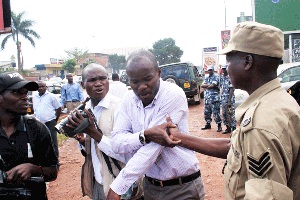While Uganda waits to see the fallout of its contentious Anti-Homosexuality Bill, some in the Democratic Republic of Congo (DRC) want to start down the same road.
In December, an MP with the Parti Travailliste Congolais (PTC), Steve Mbikayi, introduced draft legislation that would criminalize homosexuality. The DRC is 1 of the rare remaining African countries where homosexual actions have not been banned — but there is sill a good deal of discrimination against the LGBT community.
In February, Mbikayi traveled the country trying to drum up support for his bill. Besides radio and television interviews, he talked at a convention planned by the University of Kinshasa where he denounced homosexuality and targeted Western leaders for approving “unnatural acts.” Mbikayi defends his bill as being constitutional and points to article 40 of the Congolese constitution which says “all persons have the right to marry a person of their choice of the opposite sex.”
The bill, which has not been made public, contains 37o articles that make homosexuality and transgenderism unlawful. The suggested punishment for participating in a prohibited act is 3 to 5 years in prison and a penalty of up to 1 million Congolese francs — or about $1,000 USD). A transgender individual would face the identical fine, but would have a jail term of between 3 and 12 years.
If Mbikayi is successful, this won’t be the earliest time an MP has worked to see an anti-homosexuality pass. In January 2009, a bill forbidding homosexuals from adopting kids was enacted. October 2010 saw a bill named the Law Concerning Sexual Practices Against Nature was submitted by Bishop Evariste Ejiba Yamapia to the National Assembly.
The 2010 bill was never decided on for reasons that are still unclear. Today, Congolese LGBT activists want to see Mbikayi’s bill end the identical way.
Human rights activists have been petitioning MPs in response to Mbikayi’s campaign. The activists have been busy pointing out the possibly damaging connotations of the bill and some activists are confident about the success of their PR campaign.
Calling Mackay’s mission as little more than attention-seeking, Okakessema Olivier Nyamana, a lawyer that works with HIV-positive people, says that there are known gays and transvestites in communities and “No-one would try to attack them.”
Others are more fatalistic. Francoise Mukuku, executive director of Si Jeunesse Savait, an organization which lobbies for LGBT rights, said, “My fear is that the bill will pass without anyone noticing.”
If the proposed bill draws the required support, it could be debated in the DRC’s next session — March 15.
If the bill is eventually signed into law, the DRC will become the 38th African nation to criminalize homosexuality and show the rising tide of legislative homophobia on the continent.
